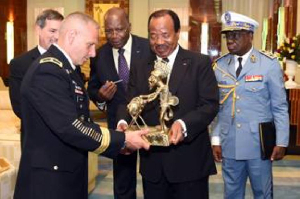Years have come and gone, political pontifications have been parroted by President Paul Biya and his cronies, law makers in Cameroon have clapped the Constitution into amendment without opposition, but the gory scares left behind by the 2008 upheavals that span from February 25 to 29, 2008, in Cameroon are still fresh in the minds of many Cameroonians.
The carcasses of hundreds that were annihilated have long decomposed, those who were christened as political scapegoats like La Piro de Mbanga has died in exile, hundreds held in various prisons across the country are still subjected to severe torture, while the likes of Paul Eric Kingue, who was held in captivity for over seven years has now regained his freedom, after the intervention of the United Nations.
But what is more preoccupying now is the disappearance of some Cameroonians, who were arrested in the wake of the uprising, but whose whereabouts cannot either be explained by their relatives or Government officials.
One of such Cameroonians is Malcolm Awah Aseli Mbakwa, a frontline youth leader in the February, 2008 upheavals in Buea.
According to family sources, Malcolm Mbakwa was arrested and detained at the Buea Central Prison in the wake of the riot, but due to severe and incessant torture, he managed to escape from prison and consequently left the country.
His vocal and renowned youth leadership skills in his Buea city did not help matters. Malcolm Mbakwa has always been a youth figure and is credited to have supported, and in some cases, founded youth movements, such as Mount Cameroon Youth and Development Association, MOCAYODE, which is affiliated to the Southern Cameroon National Council, SCNC, a movement that is fighting for the sovereignty of the English speaking part of Cameroon.
Proponents of the SCNC have repeatedly accused the Cameroon Government for gross marginalisation of the English speaking part of Cameroon.
It would be recalled that the 2008 upheavals were staged in Cameroon’s economic capital Douala, following an increase in fuel prices and poor working conditions.
The uprising was further compounded by President Paul Biya’s decision to amend the Constitution that will give him the opportunity to gun for another mandate, after his 2011 term had expired.
Biya’s move to amend the Constitution sends restive drivers and large groups of unemployed youths to the streets of Douala, Yaounde, Bamenda, Buea amongst others.
The Government responded by sending out troops to crack down on the protesters. Scores were killed and others arrested in the faceoff between the protesters and Government troops.
While some Cameroonians are still mourning their loved ones seven years after, others are yearning to reunite with theirs who have just disappeared without explanation.
Opinions of Sunday, 30 August 2015
Auteur: Lyonga Lartey














